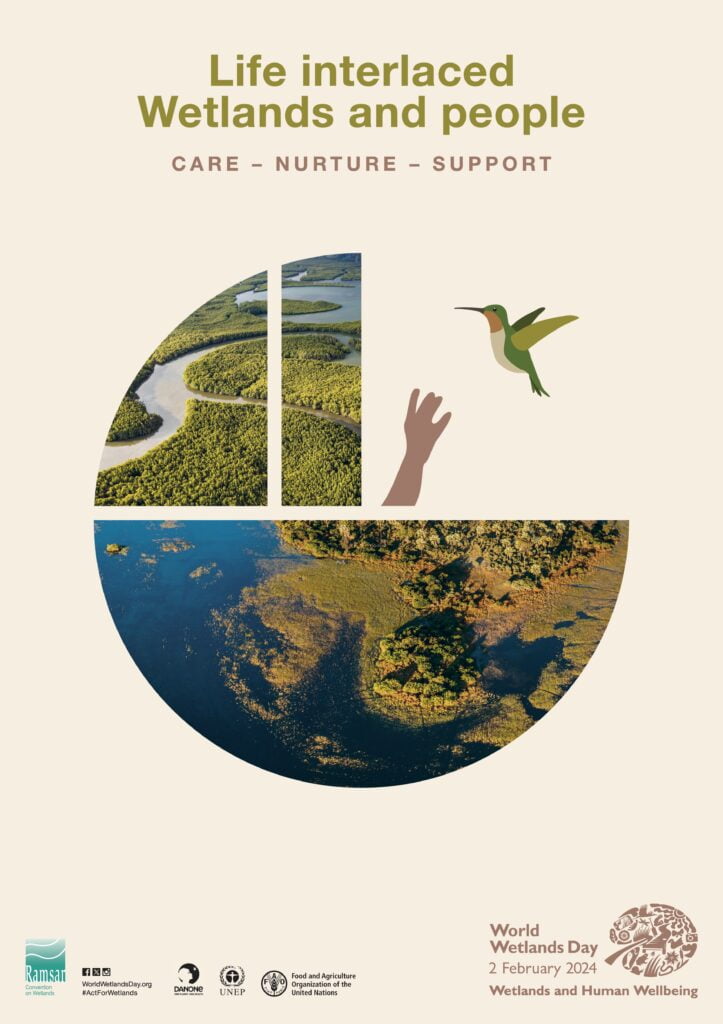World Wetlands Day is a global awareness campaign that gives voice to wetlands everywhere.
Every 2 February, World Wetlands Day joins people around the globe in celebrating the value and beauty of our planet’s wetlands. It calls nations and each of us to act on behalf of these highly productive natural environments whose existence is interlaced with our own.
World Wetlands Day has a long, meaningful history.
On 2 February 1971, the Convention on Wetlands was adopted as an international treaty. It was the first of the modern global multilateral environmental agreements and remains the only one devoted to a specific ecosystem – wetlands. Today, the Convention has a global membership of 172 countries, officially known as Contracting Parties. The Secretariat of the Convention organizes the World Wetlands Day awareness campaign, and Contracting Parties of the Convention have been celebrating World Wetlands Day since it was first established in 1997.
World Wetlands Day enjoys United Nations support.
The UN General Assembly adopted a resolution in 2021 that established 2 February as World Wetlands Day — inviting all 193 UN member states to observe the day. Almost 90% of UN member states, from all the world’s geographic regions, have acceded to become Contracting Parties to the Convention on Wetlands.
World Wetlands Day spotlights our most vulnerable ecosystem.
Wetlands are essential for human life. From filtering water, to providing food, to supporting biodiversity, to mitigating climate change, to offering livelihoods, to inspiring unique cultures, these ecosystems provide vital services that sustain our wellbeing. Yet, wetlands are the Earth’s most threatened ecosystem and we’re losing them three times faster than forests. World Wetlands Day increases global understanding of how much wetlands do for humanity and that we must care, nurture and support them for a sustainable future.
World Wetlands Day is an inclusive effort that unifies people and nations everywhere on behalf of these precious habitats.
World Wetlands Day is an opportunity for all nations and people to come together to spur awareness, appreciation and action for wetlands. People and wetlands have been intricately connected throughout human history. These essential ecosystems are important for us all. The initiative is open to everyone.
“Wetlands and Human Wellbeing” is the theme for World Wetlands Day 2024.
This year’s campaign spotlights how interconnected wetlands and human life are — with people drawing sustenance, inspiration and resilience from these productive ecosystems. Importantly, the theme for 2024 underscores how all aspects of human wellbeing are tied to the health of the world’s wetlands. It calls on each of us to value and steward our wetlands. Every wetland matters. Every effort counts.
Wetlands are a major, planet-wide habitat that makes life on Earth possible.
Wetlands are essential, biodiverse ecosystems where water is the primary factor controlling the environment and plant and animal life. They may be saltwater or freshwater, inland or coastal, natural or human-made, permanent or temporary, static or flowing. Currently, wetlands cover about 6% of the Earth’s land surface.
Freshwater wetlands include rivers, lakes, pools, flood plains, peatlands, marshes and swamps. Saltwater wetlands include estuaries, mudflats, saltwater marshes, mangroves, lagoons, coral reefs and shellfish reefs. Human-made wetlands include fishponds, rice paddies, reservoirs and saltpans.
Give voice to the world’s wetlands with key campaign messages
The overriding message behind this year’s campaign is that human wellbeing is irrevocably tied to the state of the world’s wetlands. We are dependent on these life-sustaining ecosystems. But they must be healthy if they are to continue to provide us with water and food, support biodiversity, provide livelihoods, protect against extreme weather events, and mitigate against climate change.
This year’s campaign highlights three main messages. We invite you to adapt and share
them widely.
- Investing in the sustainable use of wetlands means investing in the future of humanity.
- Wetlands can provide cities and their residents with multiple economic, social and
cultural benefits that support human wellbeing. - Wetland restoration is essential to overcoming the climate-biodiversity crisis and to delivering the Sustainable Development Goals for the benefit of all people.
Humans are destroying wetlands. About 35% have disappeared since the 1970s. Those
that remain are vanishing three times faster than forests. As a direct result, species are declining faster than at any time in human history and the pace is accelerating – with wetland species declining most.
The UN Decade on Ecosystem Restoration is a call for the protection and revival of ecosystems around the world. It runs from 2021 to 2030. By 2030, let’s reverse the decline of natural wetlands!



